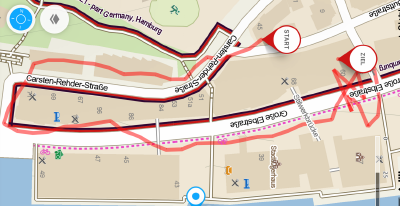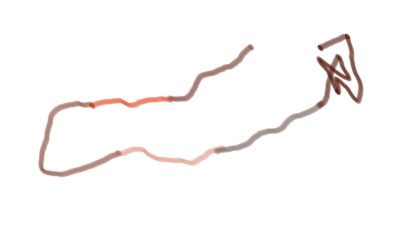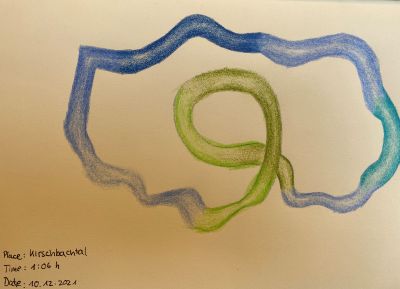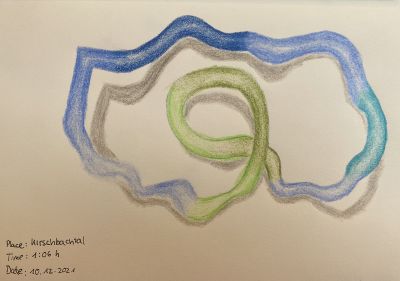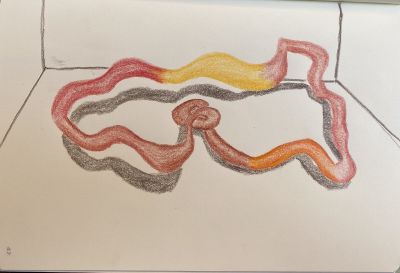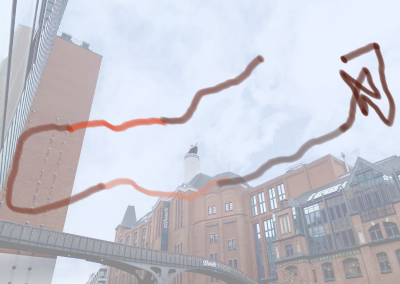GMU:Speculative Atmospheres II/Sophia Amelia Eickhoff: Difference between revisions
mNo edit summary |
mNo edit summary |
||
| Line 6: | Line 6: | ||
On the route, light, air quality, temperature, pulse and humidity are measured every minute using an Arduino and sensors. These are stored via an SD card and read out with a code. | On the route, light, air quality, temperature, pulse and humidity are measured every minute using an Arduino and sensors. These are stored via an SD card and read out with a code. | ||
<html> | |||
#include <SPI.h> //including SDcard | |||
#include <SD.h> | |||
#include <math.h> //including for temperature calculation | |||
File myFile; //directing data to file | |||
void setup() { | |||
Serial.begin(9600); //starting comunication with arduino | |||
while (!Serial) { | |||
; | |||
} | |||
Serial.print("Initializing SD card..."); //initializing the SD card | |||
if (!SD.begin(10)) { | |||
Serial.println("initialization failed!"); // signal if connection failed | |||
while (1); | |||
} | |||
Serial.println("initialization done."); // signal if connection succeded | |||
myFile = SD.open("test.txt", FILE_WRITE); //naming file | |||
if (myFile) { | |||
Serial.print("Writing to test.txt..."); | |||
myFile.println ("Spaziergang"); //naming the section of the file, date, place, number of walk | |||
myFile.close(); | |||
Serial.println("done."); | |||
} | |||
else { | |||
// if the file didn't open, print an error: | |||
Serial.println("error opening test.txt"); //signal if opening failed | |||
} | |||
} | |||
void loop() { | |||
//if the communication started successfully- | |||
myFile = SD.open("test.txt", FILE_WRITE); | |||
if (myFile) { | |||
//collect incoming data from sensors | |||
//light | |||
Serial.print("Writing to test.txt..."); | |||
int light = analogRead(A0); | |||
myFile.print( "Licht: "); | |||
myFile.println(light); | |||
//temperature | |||
myFile.print ("Temperatur: "); | |||
double temp=analogRead(A1); | |||
double fenya=(temp/1023)*5; | |||
double r=(5-fenya)/fenya*4700; | |||
myFile.println( 1/( log(r/10000) /3950 + 1/(25+273.15))-273.15); | |||
// airquality | |||
int gas = analogRead(A3); | |||
myFile.print( "Gas: "); | |||
myFile.println(gas, DEC); | |||
//pulse | |||
int pulse = analogRead(A2); | |||
myFile.print( "Pulse: "); | |||
myFile.println(pulse); | |||
delay(60000); //collect data every minute | |||
// close the file: | |||
myFile.close(); | |||
Serial.println("Sensor.geschrieben."); | |||
} | |||
else { | |||
// if the file didn't open, print an error: | |||
Serial.println("error opening test.txt"); | |||
} | |||
} | |||
<html> | |||
The time and route are stored using a tracking app.The data determines the parameters of the subsequent image design. | The time and route are stored using a tracking app.The data determines the parameters of the subsequent image design. | ||
For transport, a "rack" is built that attaches the breadboard to the body. | For transport, a "rack" is built that attaches the breadboard to the body. | ||
[[File:Screenshot (48).png|400px]] | [[File:Screenshot (48).png|400px]] | ||
Revision as of 12:33, 4 January 2022
Idea
Mapping of the Invisible Enviorment
For my project I want to collect the invisible elements (data) that shape the natural atmosphere on my walks and visualize them artistically.
On the route, light, air quality, temperature, pulse and humidity are measured every minute using an Arduino and sensors. These are stored via an SD card and read out with a code. <html>
#include <SPI.h> //including SDcard #include <SD.h> #include <math.h> //including for temperature calculation
File myFile; //directing data to file
void setup() {
Serial.begin(9600); //starting comunication with arduino
while (!Serial) {
}
Serial.print("Initializing SD card..."); //initializing the SD card
if (!SD.begin(10)) {
Serial.println("initialization failed!"); // signal if connection failed
while (1); }
Serial.println("initialization done."); // signal if connection succeded
myFile = SD.open("test.txt", FILE_WRITE); //naming file
if (myFile) {
Serial.print("Writing to test.txt...");
myFile.println ("Spaziergang"); //naming the section of the file, date, place, number of walk
myFile.close();
Serial.println("done.");
} else { // if the file didn't open, print an error:
Serial.println("error opening test.txt"); //signal if opening failed
}
}
void loop() {
//if the communication started successfully-
myFile = SD.open("test.txt", FILE_WRITE);
if (myFile) {
//collect incoming data from sensors
//light
Serial.print("Writing to test.txt...");
int light = analogRead(A0);
myFile.print( "Licht: ");
myFile.println(light);
//temperature
myFile.print ("Temperatur: ");
double temp=analogRead(A1);
double fenya=(temp/1023)*5;
double r=(5-fenya)/fenya*4700;
myFile.println( 1/( log(r/10000) /3950 + 1/(25+273.15))-273.15);
// airquality
int gas = analogRead(A3); myFile.print( "Gas: "); myFile.println(gas, DEC);
//pulse
int pulse = analogRead(A2); myFile.print( "Pulse: "); myFile.println(pulse);
delay(60000); //collect data every minute
// close the file:
myFile.close();
Serial.println("Sensor.geschrieben.");
}
else {
// if the file didn't open, print an error:
Serial.println("error opening test.txt");
} } <html> The time and route are stored using a tracking app.The data determines the parameters of the subsequent image design. For transport, a "rack" is built that attaches the breadboard to the body.
After each walk the collected Data will be read out and oil painted onto a cardboardcanvas.
- Time/Duration= Size of the canvas
- Route= Shape of the line
- Temperature= Color
- Light= Saturation of the color
- Air quality= contour of the line
- Pulse= Height of the line
- Humidity= Thickness of the line
- (distance= space around the line)
- (Background= Photograph of the Walk)
Additional
The place and the area of the walked route are indicated. Depending on what dominates the walk, a text (internal state) or a photo (external state) is attached. Also, an attempt is made to put this state in context with the collected data.
Keywords
- Determination-Indetermination
- History of Mapping
- Strollology
- Correlation of Data
- Context/ Asssociation of Color
- (Gerhard Richter)
